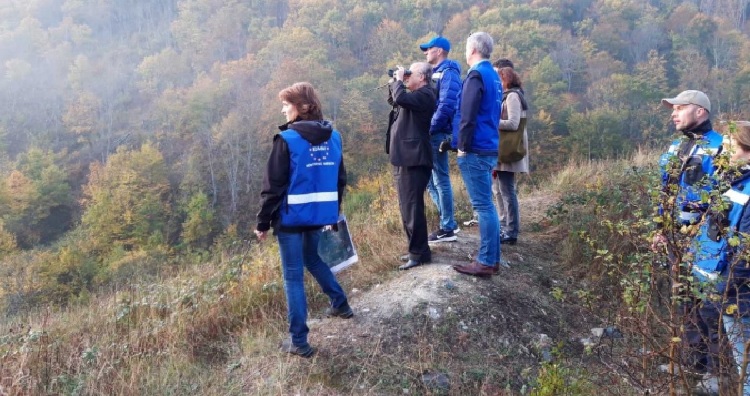EU high official joins EUMM patrols in Chorchana-Tsnelisi area

EUMM Head Erik Hoeg said he appreciates Belliard’s “strong words of support for EUMM” and the work done by its monitors “to promote stability” at the Administrative Boundary Line “on behalf of entire EU”. Photo: Erik Hoeg/Twitter
Deputy Secretary-General of the European External Action Service Jean-Christophe Belliard has joined the European Union Monitoring Mission (EUMM) patrols in the Chorchana-Tsnelisi area today.
Head of EUMM Erik Hoeg wrote on his Twitter account that he appreciates Belliard’s “strong words of support for EUMM” and the work done by its monitors “to promote stability” at the Administrative Boundary Line (ABL) “on behalf of entire EU”.
Pleased that #EEAS Deputy Secretary-General Belliard joined one of our patrols to the Chorchana-Tsnelisi area today. Appreciate his strong words of support for #EUMM and the work done by our monitors to promote stability at the ABL on behalf of entire EU. pic.twitter.com/zQUtQ9eWIz
— Erik Hoeg (@erik_hoeg) October 26, 2019
Just recently, EUMM patrol “was briefly held by armed South Ossetian security actors” in the Chorchana-Tsnelisi area close to the occupation line with Tskhinvali (South Ossetia) region.
The situation became tense on the ground after Georgia opened a police checkpoint in the village of Chorchana, on Tbilisi administered territory, in late August.
De facto authorities of Georgia’s Russian-occupied Tskhinvali region say that the tension at the villages of Chorchana and Tsnelisi will be eased only if and after Tbilisi removes the police checkpoint.
Commenting on the recent developments along the occupation line, Georgian Prime Minister Giorgi Gakharia said the territorial integrity of Georgia should be restored peacefully through daily efforts aimed at making the country “even more democratic, stronger and more attractive”.
Condemning the recent detention of EUMM monitors, Interior Minister Vakhtang Gomelauri stated that the overall situation on the ground "has not escalated".
 Photo: Erik Hoeg/Twitter
Photo: Erik Hoeg/Twitter
Gomelauri explained that Georgia has lost its territories after the 2008 war. He said any new report on the occupying forces’ erecting barbed wire fences and other artificial barriers is “unfortunate”, but it does not mean that the country is losing more plots of land.
Minister Gomelauri said everything is being done to avoid tension on the ground so that it would not grow into “a more large-scale operation”.
 Tweet
Tweet  Share
Share